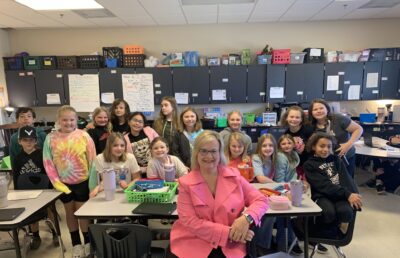
Just over two years ago, when I was appointed Executive Director of the North Carolina Association for Public Charter Schools, I made a promise that has underpinned each day of my work since: ensure that all students, regardless of background or race, have access to a great school and first-rate education. I made this commitment because I believe in the Association’s mission of advancing quality educational opportunities for all North Carolina children by supporting and expanding successful charter schools.
As a former teacher and co-founder of Uwharrie Charter Academy, I know the one thing above all else that makes a difference in students’ lives: good teachers. That’s why, at all North Carolina Public Charter Schools, our top priority is to provide our students with teachers that educate in compelling, inspiring ways. Our students come first, and that means finding and retaining great teachers.
But fulfilling that mission means more than just finding great educators; it also means finding teachers that look like the students they are teaching. According to a 2017 study from John Hopkins University, black students who had at least one black teacher in elementary school were 29% more likely to graduate high school, while those same students were 39% more likely to consider attending college. In short, offering students a teacher who looked like them often translated into impactful results and set students up for success.
At public charter schools in our state and across the country, creating diverse representation in the classroom is central to charters’ abiding mission: providing a great education for all students. At the North Carolina Association for Public Charter Schools, we seek to realize that by ensuring all students, regardless of their background, race, or zip code, can succeed.
Now, we have important new statistics that show precisely how our state’s charter schools are doing that.
According to a new study released by the Thomas B. Fordham Institute, black students in public charter schools in North Carolina are approximately 50% more likely to have a black teacher than their traditional public school counterparts. For many students, having a teacher they can relate to can make all the difference. Moreover, the study, entitled “Student-Teacher Race Match in Charter and Traditional Public Schools,” discovered that charter schools proportionally employ about 35% more black teachers than traditional public schools.
As our state—and indeed, the entire nation—continues to grapple with troubling disparities in graduation and performance rates across racial lines, I think it’s important to consider these findings more carefully. While depictions in news media often frame charter schools as existing for the privileged elite, they are actually on the forefront of ensuring that all of North Carolina’s students can show up to class each day and feel empowered, motivated, and understood.
And the statistics speak for themselves. The 2018 Charter Schools Annual Report shows that over 40% of public charter schools earned a School Performance Grade of an A or B. Further, an emerging trend over the past several years reveals that charter schools are becoming more racially diverse. And public charter schools’ students outperformed their district counterparts in every tested subject with the exception of high school math.
As educators, our work is never complete. We know that too many disparities still exist and too many students are not receiving all the resources they need. But it’s important to recognize how far we have come. As I look out across our state today, I am proud that so many students are finding an enduring resource in public charter schools, and that those schools are offering both them and their families the tools they need to succeed, from high school to college and beyond.
Recommended reading



